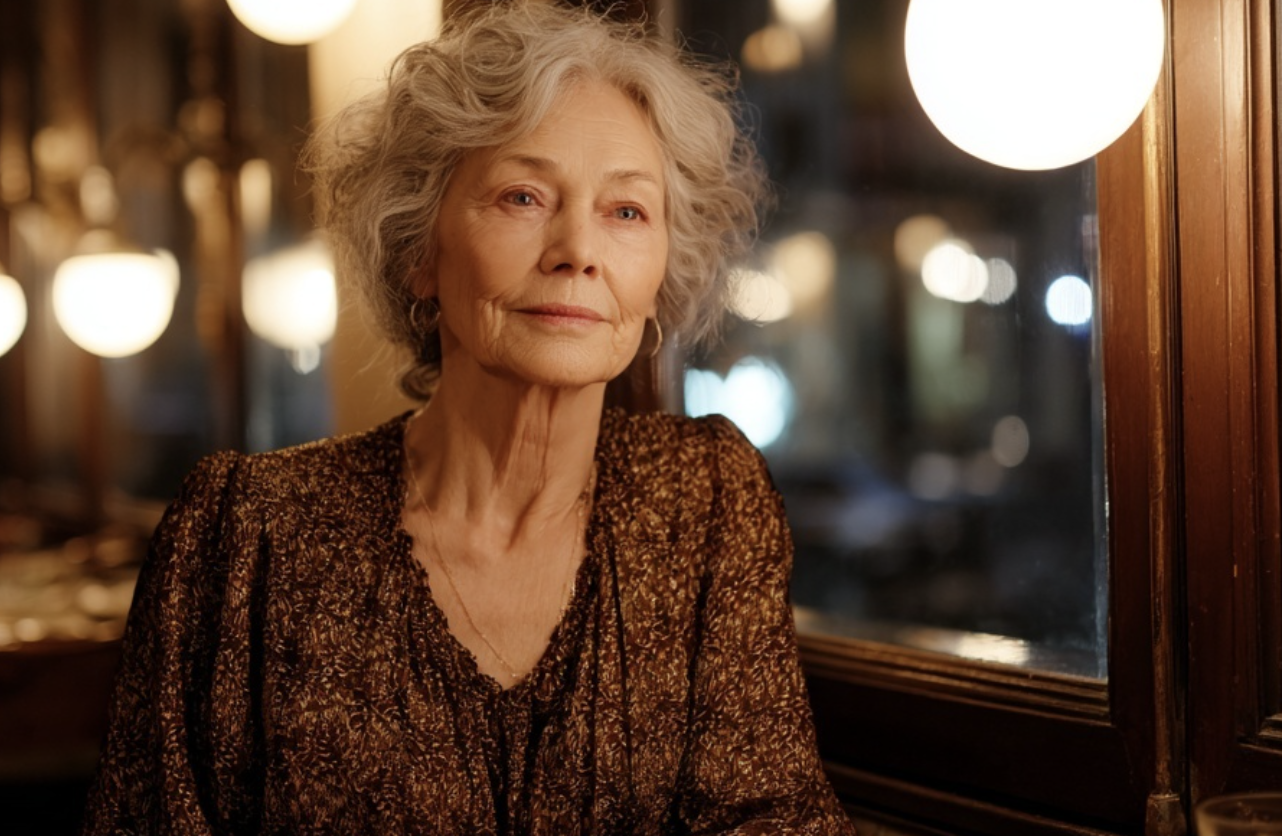I was taking plates down from the shelf for the guests when I caught a snatch of conversation in the hallway. Nina, my cousin, was whispering to Artyom, but clearly enough:
“She works at a bank—she gets bonuses and incentives… They say Marina’s already paid for everything. Can you imagine what a celebration it’ll be?”
Artyom yawned and snorted:
“What else does she have to spend her money on if she lives alone? Let her shell out. We want to have some fun too.”
They didn’t even notice I was there—apparently sure they were out of earshot. But I heard every word. It became clear: they hadn’t come “just for tea” again. Their goal was obvious—to force me to bankroll Grandma’s milestone birthday at an expensive restaurant. They had already decided I’d “organized everything ages ago” and even managed to put down a deposit.
Holding my emotions in check, I invited everyone to the living room and set out plates of snacks in front of them. Aunt Natasha, always so forthright, glanced around my interior and said with a touch of irony:
“Marinochka, it’s so cozy here! It’s obvious you don’t skimp on your home. By the way, we were thinking… Aren’t you the perfect person to take on organizing Grandma’s jubilee?”
Her voice was gentle, but every word carried a hidden mockery. Uncle Yura, usually more blunt, added:
“Who else if not you? Your mortgage is almost paid off, work is going well. Grandma should be honored properly, and she doesn’t want to strain herself—she’s over eighty, after all.”
I smirked inwardly. In reality my mortgage is far from closed, and I practically have to beg for bonuses at work. But that doesn’t matter to them—in their minds I’m an endless source of money.
Our family gathers once a year at Grandma Antonina’s, who lives in a spacious Stalin-era apartment. In the past, all the celebrations were held there. But now Grandma announced she was no longer willing to host large crowds. Aunt Natasha and Uncle Yura, both past fifty, exchanged a glance: they clearly had no intention of organizing anything themselves. Their children, Nina and Artyom, were just as unenthusiastic about paying or spending time. In the end they chose me—the “well-off” granddaughter who, in their view, has no ties (no kids, lives alone) and therefore no other expenses.
These relatives long ago turned into real exploiters. They’d ask to “borrow till payday” and never return the money, or take my new blender on some pretext and bring it back broken. I gave in every time, and apparently they decided I could afford anything.
This time they arrived as a whole delegation: Nina, Artyom, Aunt Natasha, Uncle Yura, and a couple of distant relatives. Settling at my table, they started showing pictures of luxury restaurants, discussing menus and prices.
“Marina, look—this one does a chef’s buffet table!” Nina chirped, a woman in her thirties with flawless makeup and the latest iPhone model. “Just imagine the content we can make for social media! We’ll all look gorgeous, we’ll seat Grandma in the center…”
I cut her off:
“Hold on. And who’s paying? These are not small amounts.”
Uncle Yura instantly put on a jovial smile:
“We’re family! Everyone knows you’re not stingy. Plus you’re so practical—you’ll find the best deals, you know where to save. So take care of it, and we’ll support you morally.”
Remembering how these same people ignored my pleas for help when I scrimped and saved for the apartment’s down payment, I took a deep breath. Back then no one even offered a word of support. And now they’re demanding a ‘fancier’ restaurant.
Aunt Natasha made a theatrical pause:
“Marinochka, surely you’re not begrudging this for Grandma? It might be one of our last family celebrations…”
I bit my tongue. Of course Grandma deserves a good party. But why should I be the one to shoulder the entire financial burden? Especially knowing that afterwards they’ll gossip behind my back: “Marina could have spent more…”
“Let’s do this,” I said calmly. “I’m ready to cover part of the costs. But you have to pitch in too. We’ll split it up—everyone pays what they can. I’m not going to finance everything by myself.”
The room froze. Nina spoke first:
“Well… Right now all my funds are tied up in a vacation. I’ve dreamed of the sea for so long.”
Artyom shrugged:
“My car needs repairs. I don’t have spare cash.”
Uncle Yura muttered:
“Your aunt and I have a loan… Times are tough. If you just paid everything up front, it would be much easier.”
As usual. They were sure I was just “haggling,” when in fact this was a matter of principle. I stood up, pretended to refill the teapot, and said quietly:
“Fine. I’ll think of something. Of course, we’ll give Grandma a top-notch celebration.”
Those words sent Aunt Natasha into raptures; she immediately clapped her hands:
“Smart girl! So we can count on you.”
I turned my back to her, hiding a smile: “Count on me? We’ll see what you mean by that.” I knew perfectly well that if I gave in, they’d only feel even more entitled to use me. So when the relatives left my place, I called my old friend Oleg, a manager at a well-known restaurant.
“Olezha,” I began, “I need your help. Get ready for a family comedy with an unexpected ending.”
Oleg laughed:
“Got it. It’ll be a gorgeous party with an interesting twist.”
We discussed all the details. I reserved a hall and paid a deposit I could afford without hurting my budget. At the same time, I asked Oleg to include all my relatives’ “refined” requests: expensive champagne, exclusive appetizers, dramatic plating. They love luxury—let them have it to the fullest.
The day of the jubilee arrived. The relatives, like peacocks, swept into the restaurant in their finest outfits. Grandma Antonina, elegant and a little fluttery, brought along an old friend no one knew about in advance. But who would deny her that small pleasure?
Everyone was sure it was all paid for already. Someone even whispered as I passed:
“Marina, as always, you’re on top of things! Looks like you really splurged.”
Polite waiters greeted us and led us to a private room. The tables were groaning with appetizers, floral arrangements adorned every corner, and live music created a festive atmosphere. Nina, in a sparkly dress, immediately pulled out her phone and started filming stories.
“Girls, look at this splendor! All of it for our granny!”
Aunt Natasha practically glowed with pride, imagining herself the heroine of the story she’d tell her friends. Meanwhile, Uncle Yura went over to a bottle of pricey champagne and asked:
“Can we take a couple of bottles to our table?”
“Of course,” I replied with a smile. “Just don’t forget to pay afterward.”
“What?” He froze, startled. “But… isn’t it included?”
“Don’t worry, Yura,” Aunt Natasha soothed him. “Marina has taken care of everything. Or she has a corporate discount. We know how she organizes things.”
I only shrugged, keeping my expression enigmatic:
“Don’t fret—we’ll sort it all out after the evening.”
The relatives kept on enjoying themselves, savoring every minute. Photos flew to social media; glasses clinked; the toasts got louder. Everyone was sure their favorite “sponsor” had once again picked up the tab.
When the mains were served and some had moved on to hard liquor, I noticed Nina whisper something to Artyom. He frowned and began studying the menu. It looked like they were starting to suspect the evening might end in an unpleasant surprise.
The thunderclap came when, after the cake, Oleg entered the room in a flawless suit. Approaching our table, he announced loudly:
“Dear guests, I hope you enjoyed our service! We’re about to prepare the final bill. You can pay in cash or by card.”
Nina nearly dropped her phone. Artyom spilled a drop of wine on the tablecloth. Aunt Natasha lost her smile, and Uncle Yura lowered his eyes.
“Wait,” the latter protested. “Didn’t Marina settle everything in advance?”
Oleg politely nodded toward me:
“Marina paid the deposit for the hall reservation. The rest is calculated on the spot, based on the number of guests and the dishes ordered.”
Aunt Natasha tried to salvage the situation:
“But, Marinochka, you said you’d take care of everything…”
“And I did,” I replied evenly. “I provided us with an excellent venue and service. But remember I suggested splitting the costs? You said you had no money. If that’s still the case, you’ll have to find a way to pay.”
Uncle Yura couldn’t contain himself:
“How could you?! You tricked us! We were counting on you!”
“On me?” I asked. “And I was counting on your honesty. But every time it comes to sharing expenses, you find a thousand reasons why you can’t contribute. Just like before, when you ‘borrowed till payday’ and never returned anything.”
Nina flushed and tried to defend herself:
“Oh come on, Marina, you have a good salary. Don’t be so stingy. It’s Grandma’s jubilee!”
I raised an eyebrow:
“Stingy? That’s funny. And what do you call people who constantly take money and never pay it back? Or those who use other people’s things and return them broken?”
Artyom started frantically calculating how much he’d have to pay for his choices. His face darkened. Aunt Natasha covered her mouth with a napkin, pretending she’d suddenly been overcome by some delicate dish when in fact she was clearly searching for an exit.
“Maybe,” she said in a thin voice, “we can find some sort of compromise? For example, split the total among everyone?”
“Of course,” I agreed. “That’s exactly what I proposed from the start. Everyone pays for what they ordered. You just can’t keep acting like I’m obligated to take it all on myself.”
Oleg, standing nearby, added:
“By the way, the total may increase if anyone wants to extend the evening or order extra drinks. So I recommend thinking ahead.”
Aunt Natasha put on a plaintive face, and Artyom muttered something unintelligible. But it was already too late—their game was over. Now they had to face a reality where you can’t dump everything on someone else.
“Marina, we’re family—you can’t do this…” Aunt Natasha tried to interject in a soft, almost pleading tone.
“I can when the family forgets to respect my interests,” I answered calmly. “Or do you really think I’m your personal wallet?”
Just then the waiters brought the bill folder and set it gently on the table. All eyes fixed on it at once, as if it were a document about to blow up our already tense atmosphere. I slowly took the folder in hand:
“So, the balance after my deposit is a substantial amount. But there are a lot of guests here, so let’s split the costs. Grandma and her friend are my gift; the rest we’ll divide among everyone.”
Nina sucked in a breath; her brightly painted lips twisted into something more like a snarl than a grimace. Artyom began nervously crumpling his napkin, his usual confidence melting away. Uncle Yura, his lofty tone evaporated like smoke, began to haggle:
“Listen, Marinochka, you understand I’ve got a card limit. Maybe you could take at least part of it, and I’ll pay you back later?”
I smirked:
“Pay me back? Like last time, when you ‘borrowed for a week’ and the debt’s been hanging for a year and a half? Thanks, but no.”
Aunt Natasha tried to seize control:
“We can… handle it later somehow…”
“‘Somehow’ doesn’t work anymore,” I cut in firmly. “You picked the restaurant yourselves, you ordered the expensive dishes. Now pay for your choices.”
Silence fell over the room, broken only by sounds from the next hall: the clink of plates, the rustle of table settings. The relatives froze as if caught off guard. One of the distant cousins stepped aside, hurriedly checking a phone or rummaging through a wallet. Their faces showed mixed emotions—from surprise to irritation.
At that moment Grandma Antonina, who had been watching with quiet sorrow, decided to intervene. She cleared her throat gently to get our attention:
“Children, don’t quarrel… Marinochka, thank you for such an evening. And don’t be angry with her,” she said to the others. “She’s a good person, and if you wanted a celebration, be so kind as to pay for it.”
There was weariness in her voice, as if she’d long known where this might lead but chose not to step in. I leaned toward her and lightly touched her hand:
“Grandma, don’t worry. This party was for you. It’s a pity it turned out this way, but sometimes you have to protect yourself—even from those close to you.”
Grandma nodded, understanding glinting in her eyes. Maybe she’d always suspected how they took advantage of me, but now it had become too obvious.
The relatives finally got moving: some tapped their cards against the terminal several times, others ran to the ATM for cash. Nina’s face—usually so photogenic—was twisted with anger; she clearly had no plans to post stories about what a great time she’d had and was likely already composing how she’d tell everyone about this “shameful evening.”
When the last payment was made and the waiters thanked us for our visit, I felt an incredible lightness. It was as if a huge stone that had weighed on my shoulders for years had finally lifted. No, we didn’t achieve family unity that night, but I did draw a clear boundary.
The relatives drifted off in silence: Aunt Natasha was the first to dart out, barely holding back tears, and disappeared into a taxi. Uncle Yura trudged along, scowling, muttering something about “betrayal.” Artyom—usually so imperturbable—was practically burning with anger now but chose to keep quiet. Nina, hurrying after them, kept hissing:
“How could she put us in that position? It’s humiliating!”
I remained alone on the restaurant steps, watching Grandma Antonina and her friend slowly make their way toward me. Her face showed both sadness and gratitude.
“Thank you, my dear,” she said, taking my hand. “Yes, there was a scandal, but what a beautiful party it was. Maybe they’ll finally understand that family isn’t only about money—it’s about mutual respect.”
I hugged her tighter.
“Exactly, Grandma. Maybe one day they’ll get it. Maybe not. But I won’t let them use me anymore.”
We stepped out into the street, the evening city wrapping us in its noise and light. Inside me, conflicting feelings battled: the bitterness of dashed expectations and the relief of finally putting my foot down. Now I knew for sure: kindness mustn’t be mistaken for weakness. If the family wants a celebration, they should learn to value those who create it—not just demand mindlessly.



